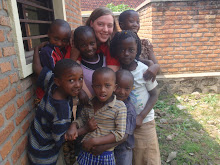Greeting people in Rwanda is extremely important. It seems as though no conversation can continue without an adequate and complete greeting. First, there is an elaborate physical greeting, composed of a hug, with three cheek-to-cheek touches, followed by a handshake. The verbal greetings are just as elaborate. There is of course the usual “Mwaramutse” or “Mwiriwe” (Good morning, good afternoon/evening). This is usually followed by “Amakuru?” (What’s the news?) or “Bite?” (What’s up?) – Standard responses are “Ni meza” (It’s well) and “Ni byiza” (It’s good). Then comes “Umeza ute?” (How do you feel?), to which most people respond “Meza neza” (I’m feeling well). Often the next questions inquire about if you’ve been strong (Warakomeye?), how your family is doing, how work is going, where you are coming from, where you are going, etc. Yes, as you’re undoubtedly realizing, it can take several minutes to even begin an actual conversation.
At this point, I’ve got the greetings down. I am a greetings master. I greet my neighborhood children, my neighbors, the shop-owners I pass on my way to work, the staff at the hospital, all the market mamas, etc. But more importantly, I greet random strangers I pass as I walk anywhere. Now, I don’t greet everyone (if I did that I’d be saying good morning about every 1.8 seconds), but I’ll tell you who I do greet:
1) Those people who greet me first. Sometimes they greet me in English, sometimes in French, sometimes in Kinyarwanda; but no matter which they language they greet me in I always greet them back in Kinyarwanda. I figure if they’re going out of their way to speak my language, I can afford them the same courtesy.
2) Those people who make eye contact with me and smile. I can only imagine that they are wondering if they should greet me, and if so in what language they should do so in (or maybe they’re just inwardly laughing at how sunburned and dirty I am). But, it makes my day when I see the shock and excitement on their faces when I greet them in their own language.
3) Those people who are openly talking about me. It’s not difficult to hear the word “Muzungu”; I can hear it from miles away at this point. My Kinyarwanda is also progressing enough now that I can start to figure out what they’re saying about me (usually such mundane things as what I’m wearing, my hair, wondering where I’m going or if I speak Kinyarwanda). These are my favorite people to greet, as it downright floors them usually when I can speak even a little of their language. They exclaim “Ahhhh, she knows Kinyarwanda!!” and giggle up a fit. Then usually blabber away to me in Kinyarwanda that is too fast for me to ever decipher. So I usually throw around an “Ehhh” with an eyebrow raise (I’ll save “Rwandan communication strategies” for another blog post) or a Yego (yes) and attempt to walk faster.
Luckily, this greeting strategy has afforded me the opportunity to meet so many interesting people as I wander this country: people transporting every type of food or object on their head (imagine everything from baskets of tomatoes or corn, to bunches of plantains, to rice bags of potatoes, to tree limbs and eucalyptus tree branches, to bed frames, to their purse), numerous school girls and boys, a priest, a woman who runs an orphanage near my house, nurses, doctors, shopekeepers, a school headmaster, and so many others. Overall, though, it’s taught me the power of greetings, how they immediately brighten someone’s day and instantly begin to build relationships. So, if you need me, I’ll be here, greeting Rwanda, one Mwaramutse at a time.
OH, but I must add one final thing. With ALL of these elaborate greetings, do you know how people end their phone calls? With nothing. No “see you later” or “goodbye”. They just hang up. Usually with me still babbling to them to have a good day. Interesting, huh?
Subscribe to:
Post Comments (Atom)
Be the change you want to see in the world.
-Mahatma Gandhi

No comments:
Post a Comment